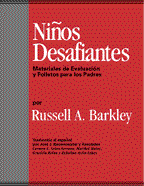 by Russell A. Barkley, PhD, Spanish Translation by Jose J. Bauermeister
by Russell A. Barkley, PhD, Spanish Translation by Jose J. Bauermeister
Updated and expanded, this remarkably clear and effective manual includes, in a single volume, a thorough clinical guide to and presentation of Barkley's ten-session training program, a fully rewritten and more extensive assessment section, and helpful parent and teacher handouts.
Full Description:
In Defiant Children, Second Edition: A Clinician's Manual for Assessment and Parent Training, Russell Barkley provides a thorough clinical guide to his proven 10-session parent training program, an updated assessment section that incorporates DSM-IV diagnostic criteria, and reproducible parent handouts reinforcing each step of the program. NiDesafiantes contains all of the assessment forms and parent handouts from the clinical manual expertly translated and ready to copy and use with Spanish-speaking client.
Updated and expanded, this remarkably clear and effective manual includes, in a single volume, a thorough clinical guide to and presentation of Barkley's ten-session training program, a fully rewritten and more extensive assessment section, and helpful parent and teacher handouts. This revised volume incorporates DSM-IV diagnostic criteria and offers even more guidelines for assessing children with defiant behavior, including a detailed parent interview that goes through each of the relevant childhood disorders. In addition, it provides two new scales for assessing the parents for ADHD or oppositional defiant disorder as well as norms for scoring them.
Clinicians who purchase this book now have permission to reproduce the parent and teacher handouts for clinical use. For the first edition, these handouts were not reproducible and were sold separately. Readers can now photocopy the forms they need as often as they need without additional purchase.
This updated version of Defiant Children provides clinicians with an excellent resource for treating children with serious behavior problems."
-Rex Forehand, PhD, Director, Institute for Behavioral Research, Research Professor of Psychology, The University of Georgia
"In the first edition of Defiant Children, Russell A. Barkley presented a well-laid out description of a parent training program for dealing with defiant, oppositional children. In this revision, Barkley has retained the strengths of the original manual and incorporated a number of improvements....Both practitioners and clinicians in training should find the second edition of Defiant Children to be a valuable and heavily used addition to their professional library."
-Robert J. McMahon, PhD, University of Washington
English Version: Defiant Children
90 pages; 8 1/2 X 11
I. Prerequisite Information for Using the Program
1. The Rationale for the Program
2. Clinical Assessment of Defiant Children
3. Practical Considerations in Parent Training
4. An Overview of the Parent Training Program
II. Guidelines for Therapists in Conducting Each Step of the Program
Step 1: Why Children Misbehave
Step 2: Pay Attention!
Step 3: Increasing Compliance and Independent Play
Step 4: When Praise Is Not Enough: Poker Chips and Points
Step 5: Time Out! and Other Disciplinary Methods
Step 6: Extending Time Out to Other Misbehavior
Step 7: Anticipating Problems: Managing Children in Public Places
Step 8: Improving School Behavior from Home: The Daily School Behavior Report Card
Step 9: Handling Future Behavior Problems
Step 10: Booster Session and Follow-Up Meetings
III. Assessment Materials
General Instructions for Completing the Questionnaires (Form 1)
Child and Family Information Form (Form 2)
Developmental and Medical History Form (Form 3)
Disruptive Behavior Disorders Rating Scale/m-/Parent Form (Form 4)
Disruptive Behavior Disorders Rating Scale/m-/Teacher Form (Form 5)
Home Situations Questionnaire (Form 6)
School Situations Questionnaire (Form 7)
How to Prepare for Your Child's Evaluation (Form 8)
Clinical Interview--Parent Report Form (Form 9)
Adult Behavior Rating Scale--Self-Report of Current Behavior (Form 10)
Adult Behavior Rating Scale--Self-Report of Childhood Behavior (Form 11)
IV. Parent Handouts for Steps 1- 10
Step 1: Profiles of Child and Parent Characteristics
Family Problems Inventory
Step 2: Paying Attention to Your Child's Good Play Behavior
Step 3: Paying Attention to Your Child's Compliance
Giving Effective Commands
Attending to Independent Play
Step 4: The Home Poker Child/Point System
Step 5: Time Out!
Step 7: Anticipating Problems--Managing Children in Public Places
Step 8: Using a Daily School Behavior Report Card
Step 9: Managing Future Behavior Problems
Stock-Usually ships in 3-4 business days!
|